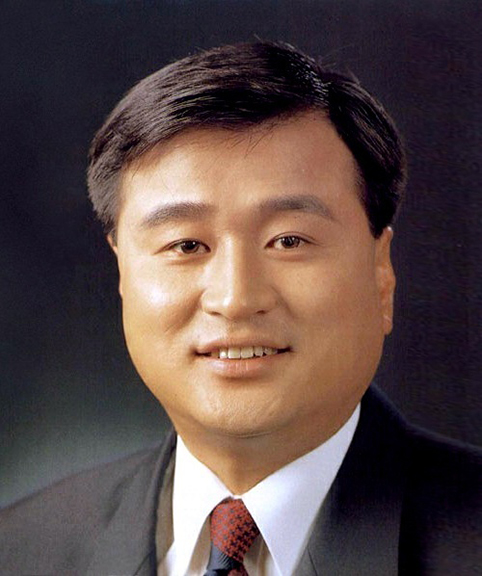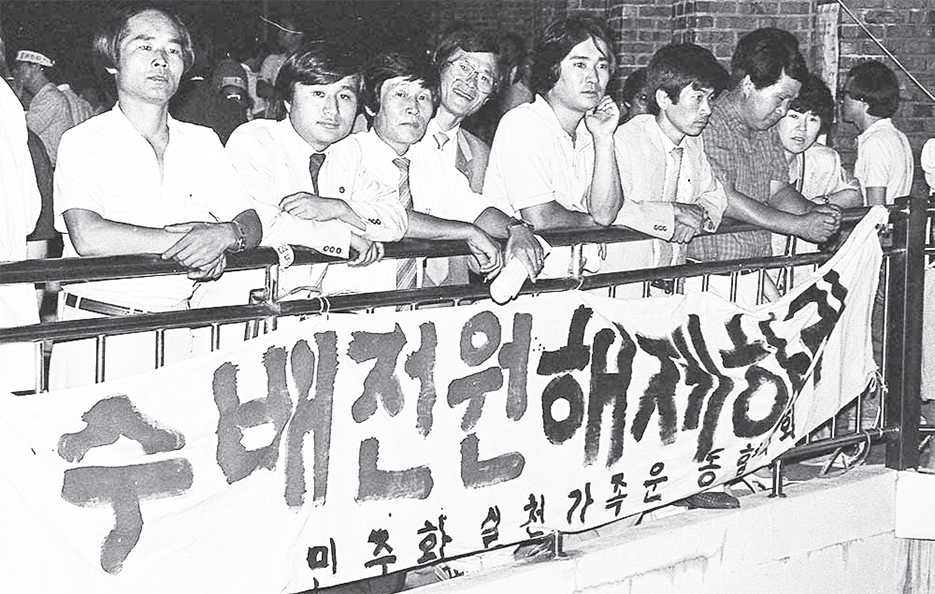
The 6.10 Uprising was a protest in which citizens won democracy through resistance against the military dictatorship. The death of Park Jong-chul under torture ignited public outrage, which spread nationwide on June 10. CBT reporters heard the story about Lim Sung-kyu (64, the former spokesperson of the Party for Peace and Democracy and an aide to a National Assembly member), who was at the scene that day, about the overwhelming emotions of June 10, 1987, in Seoul.
In 1987, public security agencies prevented former pro-democracy activists from being hired if they had participated in democratization movements or labor disputes. Lim was also unable to find employment and instead joined the Council for Promotion of Democracy (CPD). At the time, there was a saying: “The day begins with protests and ends with protests,” reflecting the chaos of the era.
One daily newspaper reported that due to the intensifying student protests and the increasing use of tear gas every year, birds had not returned to university campus in Seoul for several years, campus grass was withering, and old pine trees were drying out. The tear gas pollution around university campus not only afflicted protesting students, riot police, and local residents with tear gas-related illnesses, but also altered the natural ecosystems on campus. When entering Kyung Hee University in 1979, began actively participating in protests after the YH incident (The incident in which female production workers in the trade industry held a sit-in protest against the company’s closure). He went on to take a leading role in numerous democratization movements, including the 5.18 Gwangju Uprising and the 6.10 Uprising.
“The sight of the national military, which was supposed to protect its people, instead brutally massacring them was profoundly shocking — an act that should never have happened. Living through such a tumultuous period, I came to believe that as a young intellectual of this era, I could not stand by and watch history go in the wrong direction. That conviction led me to join the pro-democracy movement, following in the footsteps of my seniors. I felt a strong sense of duty to become an intellectual with moral integrity and a commitment to action. At that time, almost every young person came out to the streets. Watching fellow students fall, and others being dragged away by the Baekgoldan (a plainclothes riot police unit), it became impossible to remain a bystander. It was a moment when everyone had no choice but to act according to their conscience and join the protests.”
However, what made Lim’s participation in the democratization movement most difficult was his family. While his parents likely wanted to support and encourage their son, they knew that such activism could lead to imprisonment — or even death. It was a path that could ruin a person’s life, and so they tried to dissuade him out of concern.
Those around him avoided contact, labeling him “Red.” Despite all this, Lim chose to join the movement, believing that only when politics are on the right track make the people live in peace, and that a just political system influences every aspect of people’s lives. He firmly believed that citizens, as the true holders of sovereignty, must remain vigilant, monitor political power, and boldly take action when politics stray from the will of the people.
On June 9, 1987, the day before the 6.10 Uprising, the police deployed triple security cordons to block access to the venue and prevent student activists and dissidents from entering. Police forces were also stationed around university areas where protests were anticipated.
On June 10, at the main venue of the rally — Seoul Anglican Cathedral of St. Mary & St. Nicholas — around 40 figures from the pro-democracy movement who had entered before the police blockade convened and declared, “We are beginning a democratic campaign to overturn the 4.13 Constitutional Safeguard Measure, which betrayed the people’s demand for constitutional reform.” Outside the venue, students and citizens attempted to enter, but were met with a heavy police blockade formed in three layers. When police fired tear gas to stop them, violent clashes broke out. Confrontations between demonstrators chanting: “Abolish the constitutional protection, overthrow the dictatorship,” and the police erupted not only near the cathedral but throughout central Seoul. Stones torn from pavements flew through the air, mingling with clouds of tear gas. Buses, taxis, and private vehicles passing through Gwanghwamun blared their horns in support of the protesters, while citizens lining the streets waved small national flags and joined in the chants.
Many students and citizens were taken away by the Baekgoldan police, and during this process, they were not only severely beaten but in some cases, female students were mercilessly dragged by their hair. Department stores and shops near the protest site closed their doors, and some passersby collapsed from exposure to tear gas and had to be taken to the hospital. For Park Jong-chul, the protest of that day was a succession of the struggle which he had begun since entering university in 1979.
“My mom called me a protester. I was under surveillance by detectives from Intelligence Bureau, taken away and beaten, then came home moaning in pain, putting patches on my injuries. When I eventually ended up in prison, my mother’s words came to mind. Especially, during the 6.10 Uprising, I joined protests every day. When I came home late at night, my mother would be waiting at the door insisting that I take off my clothes, because of the tear gas smell which kept my family sneezing.”
After he took a bath and changed his clothes, she prepared a late dinner for him and then washed and hung up his clothes. When the 14th president Kim Young-sam and the 15th president Kim Dae-jung appeared on TV, she criticized them as “The enemies who ruined my son.” Yet, his parents silently patted his shoulder all the while.
“During the 6.10 Uprising, I was the youngest member of CPD, so I received what could hardly be called hospitality at CPD protest sites. Since I was the youngest, they told me to stand at the front of the protest line. Standing at the front, I was exposed to a lot of tear gas and was dragged away and beaten by the Baekgoldan police many times. Unlike other organizations, CPD championed nonviolence during the democratization struggle, so we had no choice but to resist with our bodies. One memorable incident is when the protesters surrounded about ten riot police in front of the Bank of Korea. The resentful protesters kicked at the riot police as if they were ready to kill them, while tearing off their helmets and expropriating their shields. As their helmets were taken off, their youthful faces were trembling with fear. Seeing their youthful faces trembling with fear, I felt a sense of pity for them. Therefore, I intervened and persuaded the protesters by saying, ‘What crime have these people committed? It is the military dictators we should be holding accountable. Let’s not fight among ourselves as young people living in the same era. Whether students or riot police, they are all victims of the military dictatorship. If we resort to violence against them, how are we any different from the military dictatorship?’ Fortunately, the protesters returned the items that they had taken from the riot police and safely let them go.”
The June Struggle for Democracy, which demanded a constitutional amendment for direct presidential elections, was “de facto” a fight with no guaranteed outcome. At the time, the military regime was a group that could declare emergency martial law at any moment and suppress civilians by force with guns and tanks. However, the only weapons the citizens had to resist them were Molotov cocktails and stones.
“I thought it was a distant dream to overthrow the ruthless military regime and achieve democracy. However, we were vindicated by the 6.29 Declaration of Surrender. It truly made me realize how powerful the people’s strength is. Just like the Xunzi saying, ‘Water can carry a boat and overturn it,’ I believe the sea of the people can grant power, but it can also overturn it. No power can ever overcome the will of the people.”

▲ Lim Sung-kyu, who was participating in the democratization movement (the second person from the left) “Lift all arrest warrants.”
He is still struggling with trauma he suffered from participating in the democratic movement. “If caught and dragged away during the uprising, they were taken to the interrogation room. They blindfolded me and made me lower my head. After walking for a long time, I heard the clanking sound of metal doors. When I opened my eyes, I could not tell if I was underground or above ground—it was a windowless room with only a single lantern. In there, I was beaten during the interrogation. Then they blindfolded me again, took me back to the police station, and let me go. I still remember what one of the police officers said to me: ‘Killing someone like you is nothing. We could kill you and bury you somewhere near the front line of the DMZ, and no one would ever know.’ That is why, even to this day, I can not sleep with the lights off.”
Lastly, he said, “I hope that future generations will remember that the democracy we enjoy today was built upon the sacrifices and dedication of many students, citizens, and workers. Particularly, I hope they never forget that the noble sacrifices of patriotic martyrs activists Park Jong-chul and Lee Han-yeol became a turning point that brought our democracy forward. There were countless sacrifices to achieve the democracy we have today despite harsh repression, but I do not want to think of them as suffering. I want to think of them as the labor pain a mother endures to give birth to a precious baby. I hope future generations will cherish the democracy our predecessors fought so hard to achieve and build an even more just and prosperous democratic society. Honoring the spirits of the brave souls who sacrificed their lives for democracy, I hope we will forever protect the precious liberal democracy that they ultimately achieved by believing in the progress of history, even as they fell.”
By Park Min-a
pmina0124@chungbuk.ac.kr
By Park Ryeo-won
2024078018@chungbuk.ac.kr


 All
All Feature
Feature






 Park Min-a
Park Min-a











